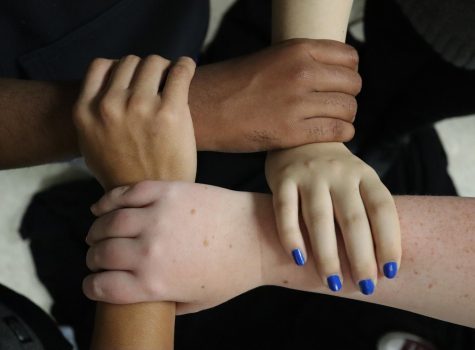Appreciation vs Appropriation
December 8, 2022

The world is moving in a more culturally aware direction. However, whether it’s a lack of understanding or even blatant disrespect towards another culture, cultural appropriation manifests itself in society.
What is cultural appropriation?
“I would say that cultural appropriation is when people who are outside of a culture … kind of take elements of it without properly attributing it to the culture that they took it from,” senior Meghana Nakkanti said.
Dr. Abby Templer Rodrigues, assistant sociology professor at Missouri State University, said society is shaped by systems of stratification.
“We most often talk about cultural appropriation related to race and ethnicity – in the American context that takes the form of whites, the dominant culture, adopting or exploiting the culture of minoritized racial and ethnic groups,” Templer Rodrigues said.
Instances of this include profiting or experiencing some type of gain from elements of another culture that is not one’s own, exploiting another culture for popularity and many other situations similar.
Templer Rodrigues said that one of the most prominent examples of cultural appropriation is the use of Native American symbols in professional sports teams.
“The one that hits [close] to home are the Kansas City Chiefs,” Templer Rodrigues said. “In 2021 the team stopped using some Native American imagery but has kept the name. Other teams, like the Cleveland Guardians and Washington Commanders, changed their names and stopped using Native American imagery. These changes were in response to years of activism from Native American groups.”
When incorporating culture other than one’s own, there is a distinction to be made between cultural appreciation and cultural appropriation. Junior Angela Lee said that the line between cultural appropriation and appreciation is when there is not a clear understanding of the background of a culture.
“When you are actually celebrating it you actually understand the meaning, you know the traditions behind it and the story … instead of trying to copy the culture,” Lee said.
Jessica Durham, American history, psychology and sociology teacher at Nixa High School, said she believes the line can be drawn by looking into a person’s intent and knowledge about other cultures.
“In other words, are you doing this thing for yourself, will it benefit you in some way and do you understand why you are doing this thing or are you doing it for others?” Durham said.
Social media doesn’t help
Social media is a major factor in the expansion of certain ideas, opinions, trends and more. Junior Loui Fuentes said cultural appropriation is easy to find on social media.
“[I] think people would see [aspects of another culture] on social media … and they don’t know the whole back story to it or they don’t know what it means …” Fuentes said. “… Someone can post a video of them doing something of a different culture and someone else sees it and thinks it’s OK to do it even though they don’t know what it is or don’t try to learn about it.”
With the rapid speed of how these ideas spread on social media, Lee said cultural appropriation in the media negatively impacts people because of the way social media fuels itself.
“So even if one video on TikTok goes viral, suddenly everyone’s adapting it and it doesn’t matter if it’s true or false,” Lee said. “It’s just something everyone’s going to do.”
The National Association for the Advancement of Colored People Collegiate Chapter at Missouri State University said that social media outlets such as TikTok, Snapchat, and Instagram are filled with cultural appropriation.
“… [They are] a gateway to misinformation and demeaning of other cultures and diverse groups,” according to a statement from the NAACP MSU College Chapter. “This gateway promotes discrimination, and a lack of cultural competence toward others within diverse groups as well.
Just like anything else that goes viral on social media, the root cause of virality is interest.
Junior Sanjay Vasidhar said the spread of cultural appropriation continues on social media because people believe whatever it is they are seeing.
“Those platforms don’t … moderate those types of content so people are just exposed to all types of opinions,” Vasidhar said. “And the [social media] algorithm learns what type of content pleases the user and continues to feed that person the same type of similar content.”
Regardless of the media exposure, Nakkanti said she thinks most people don’t appropriate other cultures intentionally.
“I think a lot of it is like seeing someone from a different culture wear something really cool or say something in a language that’s really interesting, and we kind of want to emulate that or see how we can bring it to our own life,” Nakkanti said. “So I feel like nine times out of ten it’s not done in a manner that is supposed to be disrespectful or rude.”
It’s about understanding
While the rapid spread of cultural appropriation may not be intentional in every case, it is important to realize that aspects from other cultures are not trends.
“… It’s not a trend for you to take someone else’s culture and be like, ‘I made this up myself,’ ” Nakkanti said. “You might have [made it popular], but you didn’t start it – you don’t know what it means.”
While social media is a way for people to branch out, Nakkanti said it is difficult to distinguish internet culture from culture in reality.
“I think social media has done a lot of good in terms of connecting people from different cultures, different places and because of that it’s almost like there are just subcultures of one larger internet culture,” Nakkanti said. “But it’s important to realize that outside of the internet, there’s also these communities that have all this history and all these traditions that are important to respect.”
Appreciating the background behind certain aspects of other cultures is a crucial part of understanding cultures other than one’s own.
“Culturally appreciating something is when someone actually spends time learning about other cultures and doing their research – helping them connect with people from those cultures,” Vasidhar said.
Fuentes said a way to appreciate culture is to branch out and learn about the real meaning.
“[Learn] more about it and [don’t] just celebrate it because you want to … do something fun,” Fuentes said.
When people think about other cultures, they tend to think of the stereotypes of them.
“When you teach people about the background and the meaning behind it, they tend to appreciate it more,” Lee said.
Durham said cultural appreciation stems from a desire to understand.
“I believe appreciation stems from simply doing your research,” Durham said. “Especially with technology today, it does not take long to read up on the history of cultures to gain a better understanding of what is sacred or meaningful to others.”





